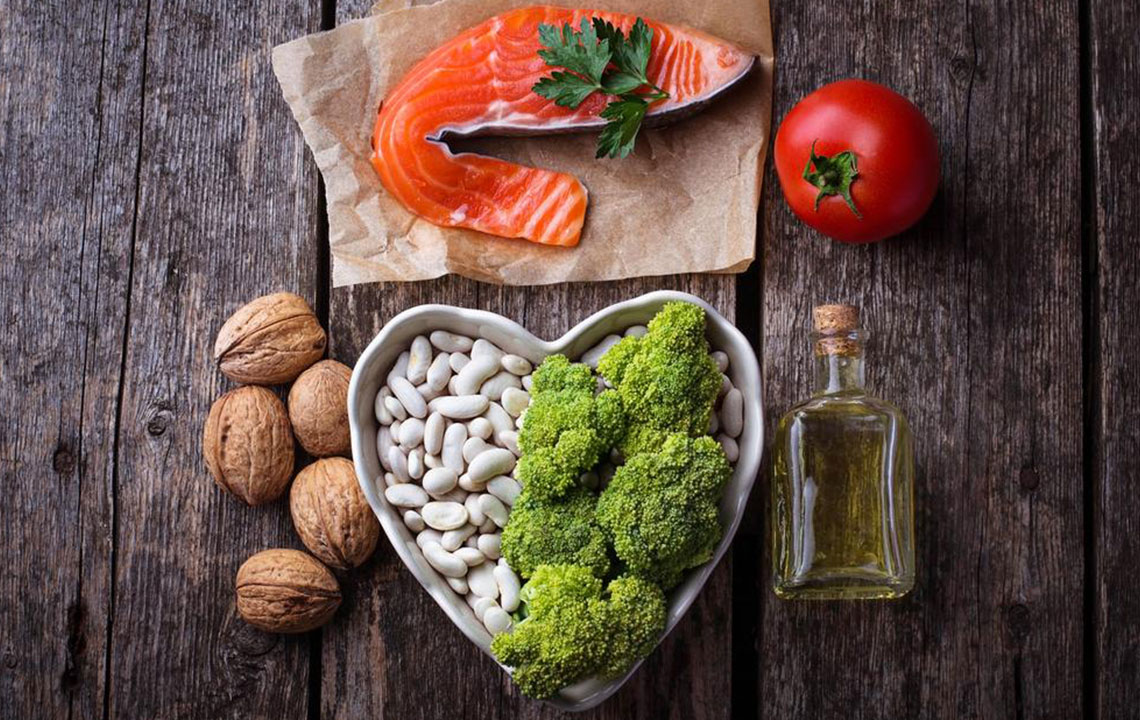Some Popular Foods Items that Lower Cholesterol

We are what we eat, which is why it is so easy to eat into high levels of cholesterol with foods that are high in the same. Conversely, eating foods that have low cholesterol triggers help lower cholesterol levels too. To lower high cholesterol levels, two strategies can be followed:
Adding cholesterol-lowering foods that lower LDL or low-density lipoproteins
Cutting back on foods that boost LDL levels
LDL cholesterol is the harmful cholesterol-carrying particle that contributes to atherosclerosis, a condition wherein arteries get blocked.
Cholesterol-lowering foods
Cholesterol-lowering foods play a significant role in controlling the levels. Foods rich in soluble fiber helps in binding cholesterol along with its precursors present in the digestive system. This fiber also pushes these out of the system before they get into circulation. Others provide polyunsaturated fats that directly lower LDL levels. Others may contain plant sterols and stanols that block the body from absorbing cholesterol.
A look at some cholesterol-lowering foods:
Oats
A bowl of oatmeal or cold oat-based cereal for breakfast is a good first step towards improving one’s cholesterol levels. Oats provide 1 to 2 grams of soluble fiber and adding a banana, or a handful of strawberries can make up for another half-gram. The current day nutrition guidelines recommend the intake of 20 to 35 grams of fiber a day, out of which at least 5 to 10 grams come from soluble fiber.
Barley and other whole grains
Similar to oats and oat bran, barley, and other whole grains also help lower the risk of heart disease through the soluble fiber they deliver.
Beans
Beans are rich in soluble fiber and since they take some time for the body to digest, consuming them makes a person feel full for longer after eating a meal. For people trying to lose weight, this makes beans a good food ingredient. Beans come in a variety of shapes and sizes and boast of different nutrients—lentils, kidney beans, navy beans, black-eyed peas, and garbanzos can be prepared in different ways to make for versatile eating options.
Eggplant and okra
Okra and eggplant are two low-calorie vegetables that are good sources of soluble fiber.
Nuts
Multiple studies have shown time and again that eating a handful of nuts like walnuts, almonds, peanuts, and others is a good practice for the health of the heart. 2 ounces of nuts every day is a good measure to reap multiple benefits and act as great cholesterol-lowering foods.
Vegetable oils
Vegetable oils like sunflower oil, canola oil, safflower oil, and olive oil instead of using lard, butter shortening for cooking purposes also is known to help lower LDL levels.
Fruits
Fruits like apples, grapes, strawberries, citrus fruits are rich in pectin which is a type of soluble fiber that lowers LDL.
Fortified foods
Stanols and sterols that are extracted from the gum of plants increase the ability of the body to absorb cholesterol from food. These are now being added to a whole range of foods like orange juice, margarine, granola bars, and chocolates, apart from being available as supplements. About 10% decrease in LDL has been noticed by consuming 2 grams of plant sterols or stanols in a day.
Soy
Soybeans and soy-based foods like soy milk and tofu are great cholesterol-lowering foods which have shown to reduce LDL levels by 5% to 6% when consumed at a rate of 25 grams of soy protein per day.
Fatty fish
Fatty fish are also great cholesterol-lowering foods that can also help lower LDL since consuming those means reducing the intake of meat which has LDL-boosting saturated fats, and also by delivering LDL-lowering omega-3 fats. Omega-3 fatty acids are known to reduce triglycerides in the bloodstream, apart from protecting the heart from irregular arrhythmia.
Fiber supplements
Fiber supplements are perhaps the least favorite method of getting soluble fiber and two teaspoons a day of psyllium is found in Metamucil, and other bulk-forming laxatives provide about 4 grams of soluble fiber.
Reducing bad foods
Harmful LDL is found in saturated fats and trans fats.
Saturated fats are found in animal products like red meat, eggs, whole-fat dairy products, and some vegetable oils like coconut oil, palm oil, and cocoa butter. Saturated fat can increase the LDL cholesterol levels.
Trans fats are best entirely avoided, and they are not required at all by the body. The FDA has banned trans fats from most US-based foods.Trans fats are essentially a byproduct of the chemical reaction that converts liquid vegetable oil into solid margarine or shortening which prevents liquid vegetable oils from turning rancid and becoming spoilt. These fats have zero nutritional value and are proven to be bad for heart health. These fats increase LDL cholesterol and triglyceride levels and also reduce levels of HDL cholesterol.
Weight and exercise also affect the number of fats circulating in the bloodstream. Inactivity reduces HDL, and excessive weight increases LDL levels.



